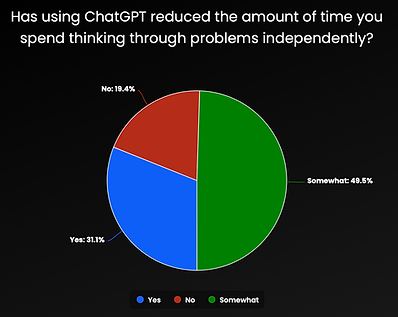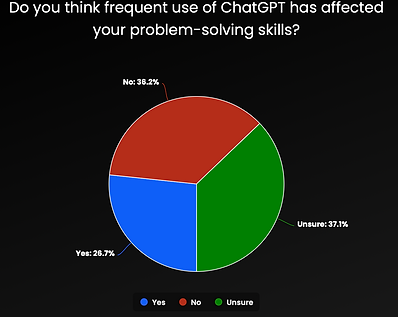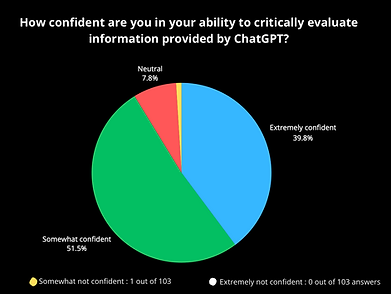
ChatGPT in student life
This section presents the results of a survey of 103 students at the University of Exeter, exploring how ChatGPT affects learning. By comparing student responses with the research literature, we examine whether AI tools promote or interfere with deep understanding, long-term retention and independent problem solving. The results highlight both the potential cognitive benefits and risks of integrating ChatGPT into academic study.


Does ChatGPT simplify learning at the risk of deep understanding and long-term retention?
The survey hows that 96% of students (99 out of 103) think that ChatGPT improves their understanding of study material, suggesting that AI is very effective at simplifying academic content. However, when asked whether this support reduces long-term retention, only 24% of students said yes, and 56% were unsure. This confirms that meanwhile AI tools such as ChatGPT offer short-term benefits (by simplifying access to information and reducing study anxiety), they can unintentionally discourage deep thinking and active recall, which are key factors for sustainable learning. This can be related with cognitive theories such as the ‘Google effect’, in which overreliance on external sources reduces memory retention.



Does frequent use of ChatGPT reduce critical thinking and problem solving skills?
The results show that 79% of students admit that ChatGPT has completely or somewhat reduced the amount of time they spend solving problems independently. In addition, 27% of the 103 students stated that the tool had had a negative impact on their problem-solving abilities, while 37% were unsure, which suggests that the long-term cognitive impact of reliance is not fully realised by many of the students. Moreover, 90% of participants were confident in their ability to critically evaluate ChatGPT responses, indicating a potential mismatch between their self-perception and their actual analytical engagement. While AI improves efficiency, its frequent use without critical examination could harm students' independent reasoning capacity and intellectual growth over time.

Are students managing to balance AI with traditional study methods?
We found it encouraging that 91% of students surveyed said they were able to balance ChatGPT and traditional study methods ‘extremely well’ or ‘ somewhat well’. It could suggest that AI is mostly use as an additional tool rather than a substitute traditional methods of study. However, considering previous responses, such as reduced independent thinking and uncertainty about long-term retention effect, to maintain strong cognitive development, students are encouraged to combine AI/ ChatGPT with active learning techniques such as problem-solving, reflective writing or peer discussions. Artificial intelligence should be seen as a tool to support reasoning, making it easier for users to come up with their own answers. Entirely delegating the generation of answers to AI, without any cognitive effort, is more likely to encourage cognitive dependency and to restrain the development of critical thinking.